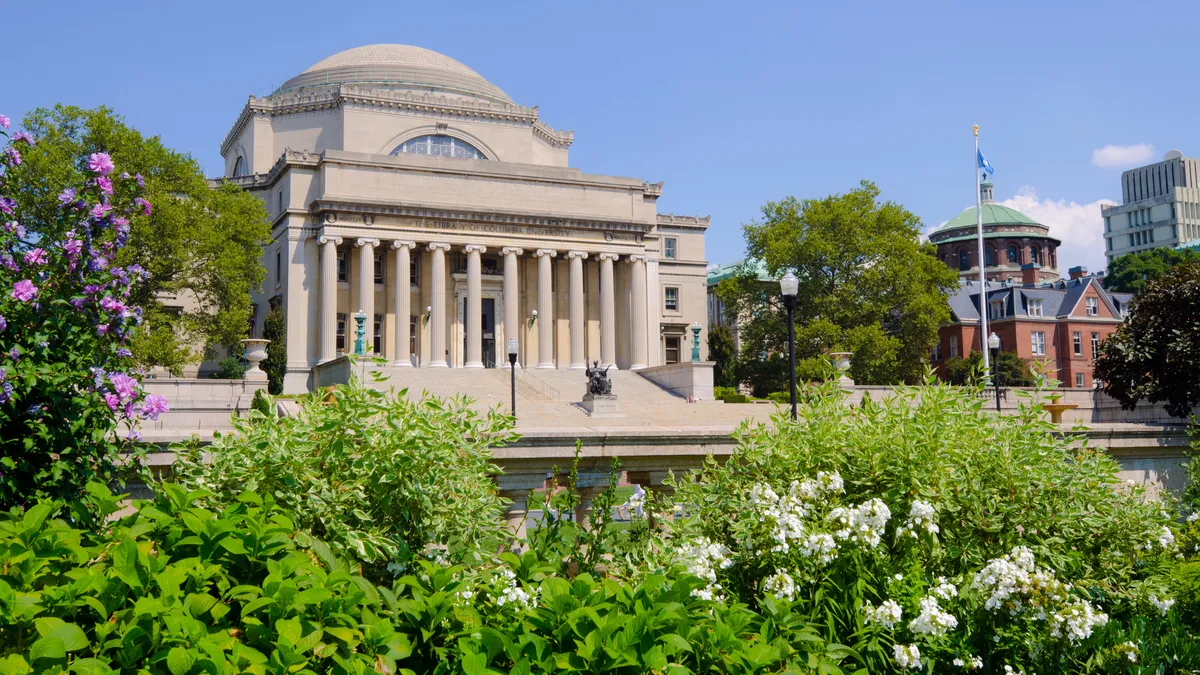Dive Brief:
- New York lawmakers unveiled a legislative proposal Tuesday that could end a property tax exemption for private nonprofit universities that had more than $100 million written off in the prior fiscal year.
- Just two universities would be affected — New York University and Columbia University. Columbia is the largest private land-holder in New York City and would have paid $179 million in property taxes last year without the exemption, according to the bill's sponsors. NYU would have paid $142 million.
- Under the plan, the resulting property tax revenue would go to the City University of New York, the city's public higher education system that has faced budgetary challenges.
Dive Insight:
Columbia and NYU have long been two of the country's wealthiest universities. But their tax status drew public attention in September, when The Hechinger Report published an in-depth analysis of the centuries-old law granting them property tax immunity.
The new proposal — introduced by state Sen. John Liu and Assembly Member Zohran Mamdani — would rescind that exemption.
However, the Democratic lawmakers would need to gain and maintain consistent support for their proposal, as the tax exemption is enshrined in New York’s state constitution.
To remove the exemption, the lawmakers would have to pass a bill amending the state’s constitution in two consecutive legislative sessions. The state would then hold a referendum on the change.
If the referendum passed, lawmakers could vote on a second bill to institute the $100 million yearly cutoff for the exemption and redirect the resulting property tax revenue to CUNY.
The exemption was originally established to support small nonprofits, Liu said in a statement Tuesday. But he argued the carveout must be reconsidered, as large universities that could easily pay property taxes are now benefiting from it.
"It makes perfect sense to direct these subsidies instead to public education here in New York,” he said.
The pair's proposal comes as "CUNY faces budget cut after budget cut and is in a constant state of disrepair," Mamdani said in a statement Tuesday. Only 8% of CUNY buildings are considered to be in good repair, according to his office.
In the 2023 fiscal year, the city of New York reduced CUNY's funding by $155 million, costing 235 faculty and staff positions, according to a May analysis from the city comptroller’s office. Inconsistent government funding, compounded with unstable tuition revenue and elevated inflation, have put the system's finances at serious risk, it found.
The analysis advised the city to reinstate CUNY's funding to help the system "remain the world class educational, research, and workforce development institution that New Yorkers need and deserve."
Comptroller Brad Lander voiced support for CUNY and the legislation Tuesday.
The system is "facing repeated patterns of disinvestment and serious financial challenges while some of the City's wealthiest private institutions expand their campuses' tax-free footprints," Lander said in a statement. Liu and Mamdani's proposal would balance these inequities and create a more democratic higher education environment for the city, he said.
In emailed statements Tuesday, both Columbia and NYU emphasized their contributions to New York City's economic and philanthropic development.
“We are reviewing the legislation but will underscore that we are a world-class research university and, beyond the financial resources we provide to our local community," said Samantha Slater, a Columbia spokesperson. She added that Columbia has long served as one of the major economic drivers of the city.
NYU did not seek out the property tax exemption, which was enacted prior to its founding, said John Beckman, a university spokesperson.
"To choose two charitable, non-profit organizations out of the thousands in the state and compel them to be treated like for-profit entities certainly strikes us as misguided and unfair," Beckman said.
NYU already pays around $15 million yearly in city property taxes, the spokesperson said. This includes on spaces it owns and leases out separate from its academic mission, as well as property taxes connected to spaces it leases.
"Were NYU suddenly taxed on its property, it would be extraordinarily disruptive, not only to our extensive operations, but to the now well-established mechanisms of support that NYU provides to every level of New York government,” Beckman said.














